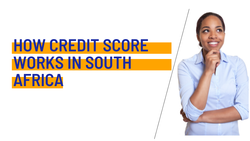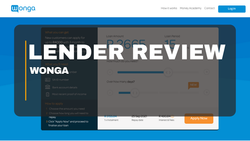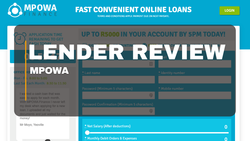It's never too late to improve your credit score and take control of your finances, and the perfect place to start is to check your credit report.
The Flair Isaac Corporation (FICO score) system calculates a person's credit score in South Africa. This scoring system uses values ranging from 0 to 999 to denote a score or points. A good credit record is defined as a credit score of 700 points or higher.
Before approving or declining your application for credit or an increase in your credit limit, credit providers analyze your credit score to assess their risk in taking you on as a client.
A credit bureau determines your credit score based on your credit history and considers how much debt you have, how you pay your bills, and, most importantly, how all of this compares to other credit-active consumers.
If you're unhappy with your credit score, think about the various factors that could negatively affect it — and what you can do about it.
Methods to improve your credit score
Just because you have a bad credit score currently doesn't mean you'll never qualify for credit or be stuck with a high interest rate loan offers. It simply implies that you'll need to make a few changes to increase your credit score and improve your chances of getting a loan in the future. Here's how to do it:
- Check your credit score: Regularly monitor your credit score and ensure all essential details are correct for an accurate credit reflection.
- Pay your bills on time: You must make sure that you pay all your bills on time. If you anticipate any problems, you'll need to contact your creditor to work out a payment plan.
- Automate payments: If you're prone to forgetting when a payment is due, set up a debit order to avoid missing the payment. And if you can pay more than the minimum payment, do so.
- Have a manageable repayment plan: If you're having trouble repaying your debt each month, try negotiating a new repayment plan with your creditor, such as lowering monthly repayment amounts while lengthening the loan term.
- Close unnecessary credit lines: Close any accounts you're no longer using, such as old clothing accounts or old credit cards. By doing this, you will get seen as a lower risk, and your score will improve.
- Reduce your overall credit balance: If you get an unexpected lump sum or a bonus at the end of the year, for example, use some or all of it to reduce the total amount of credit you owe.
- Limit credit applications: Your credit report will reflect how many credit applications you've made in the previous two years. Applying for too much credit at once can make it appear as if you're having trouble managing your current debt.
- Limit credit use: Aim for a 35% ratio, which means that if you have a credit card with an R10,000 credit limit, you should keep your monthly debt at R3 500 or less.
- Avoid too much unsecured debt: Secured loans, such as a home or car loan, are always preferable to unsecured loans, so make sure your financial portfolio is balanced in this way.
- Be cautious with credit choices: Exorbitant interest rates will be charged if you take up a revolving loan or rely too heavily on credit cards. Before you sign up, double-check the interest rates.
How fast can you raise your credit score?
Some strategies will only help you in the long run (it takes an average of 6 months to see an improvement in your credit score), while others will help you right away. The methods listed below may help you boost your credit score in as little as 30 days.
- Remove negative listings on your credit report: Get a free credit report and look over the information. Check for accuracy and ask questions about anything you're not sure about. This is the first step toward taking control of your finances. If you have any outstanding debts or judgments against you, pay them off as quickly as possible. After that, make sure you have proof of settlement, which you may use to get the negative listing removed from your credit report with the appropriate credit bureau.
- Pay off outstanding debt: Outstanding debts significantly impact your credit score, so pay them off as soon as possible. Credit cards have the highest interest rates, so start with them.
- Close settled accounts: Once they've been settled, closing accounts lowers the number of credit accounts associated with your identity. Having too many open accounts will lower your credit score because it indicates a high level of borrowing.
- Avoid using credit: While working to improve your credit score, you should exercise caution when using available credit. Taking on new debt and opening new accounts should be avoided.
- Reduce your credit ratio: The difference between the amount you owe and the credit limit impacts your credit score. Your credit utilization ratio is a measurement of how much credit you have available. For example, if you have R10 000 in available credit and debt of R5,000, your credit utilization ratio is 50%. Maintaining a credit utilization ratio of 30% or less is recommended. So, paying off your debt to reduce the 50% rate to 30% will improve your credit score in the case above. The credit usage ratio is one of the essential variables in determining your credit score and payment history.
- Check your spouse's credit score: Your credit score is not the only one to get considered. If you are married and want to apply for a joint home loan, your spouse's credit history will be considered as well. If your spouse makes the same efforts to improve their credit as you, you'll have a better chance of getting a loan in the future.
How much do you need?
Get a Loan up to R500 000
Representative example: Myloan is an online loan comparison tool and not a credit provider. We only work with NCR-registered credit providers in South Africa. Our comparison service to consumers is free of charge. Estimated repayments on a loan of R30 000 over 36 months at a maximum annual interest rate of 28% would be R1 360 per month including an initiation fee and monthly service fees. Interest rates charged by credit providers may, however, start as low as 11%. Repayment terms can range from 6 to 72 months.

























